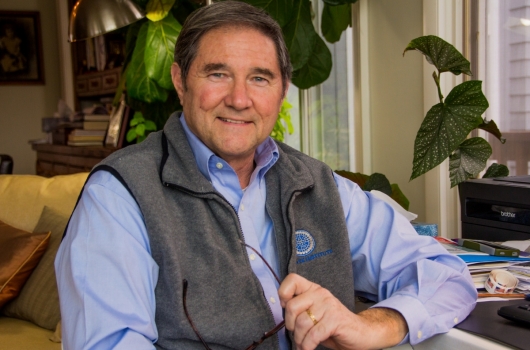Prison Ministry and Mentoring: Meeting at the Gate

Our guest blogger this month is Ford Rowan. Ford shares his insights derived from serving those who have been incarcerated. With a deep-rooted faith, Ford walks the walk. Here, he describes the value of mentoring those who return to our communities after serving time behind bars.
~Rev. Dean Bucalos, Mission Specialist, NBA Prison and Jail Ministries Affinity Group
What happens when a convict has paid his price to society? Many leave prison only to enter a revolving door. I’ve volunteered in prison ministry for 18 years. Several years ago, we celebrated when one of the inmates was about to be released. A few months later, he was back behind bars. What happened?
“When I got out, guess who met me at the gate?” the man told me. “It was Satan, and he was chomping at the bit.” He said he tried to stay on the straight and narrow, but he went back to the neighborhood where he got in trouble, back to the friends who got him addicted, back to the temptations that ensnared him. Sadly, it was not a surprise to see him again.
The program in which I serve is the Kairos Prison Ministry. I’ve served in 10 prisons in 5 states, including my home state of Maryland. Kairos doesn’t advocate on behalf of prisoners, or lobby for criminal justice reform, or run re-entry programs for inmates who are released. But a few years ago, Kairos authorized a pilot program in Maryland for re-entry. It has been a remarkable success. Of the first 48 inmates we mentored, only one has been re-incarcerated after being released.
The secret of our success is not a new discovery. Byron Johnson wrote a great book, More God, Less Crime. He explained the results of a study in Texas prisons. The most effective way to reduce recidivism is to have a mentoring program that is faith-based, that starts inside prison, that provides inmates training and fellowship, and that continues after release by providing mentoring, integration in a faith community, and help finding housing, jobs, addiction recovery services, and healthcare.
Professor Johnson says that ex-offenders who graduated from the in-prison program and continued with the same mentors after release were twice as likely NOT to end up back behind bars as were others without this sort of mentoring.
The evidence from Texas shows that we can cut recidivism in half. I believe it is because mentors form bonds in prison that continue when the returning citizens are released and their mentors meet them at the gate.
There are several things that impede this evidence-based approach to reducing recidivism. First, many states prohibit registered volunteers who go into prison from having any contact with someone on parole or probation. What this means is that volunteers who go into prison cannot mentor returning citizens and can’t even greet them if they show up at their church.
Fortunately, the leaders of the Department of Public Safety and Corrections in Maryland realized that this was a barrier to successful re-entry and modified that rule. Now volunteers can request approval to mentor those being released.
Another problem is the policy of the Kairos Prison Ministry, which decided not to launch re-entry programs and discourages its volunteers from contact with those released on probation and parole. Our re-entry program in Maryland was spun off and is now independent, but all our mentors are Kairos volunteers.
We are called (in Matthew 25:31-46) to visit and care for those who are imprisoned. If we love them inside the walls, are we supposed to shun them when they get out? Here’s what some of our graduates said:
“Thank you for mentoring me and being there when I needed you,” Derrick said. “I don’t think I could have successfully stayed out without you.”
“I could not be the man that I am without your great support system for me and my family these last three years,” Marcellus said.
We need more volunteers in prison, and we should not hesitate to welcome ex-offenders back into society.
Ford Rowan is a former director of Human Rights Ministries and continues as a volunteer in the Disciples Center for Public Witness in Washington. Rowan is a guest blogger with the NBA Prison and Jail Ministries Affinity Group, through which we support congregations and individuals as they engage in prison- and jail-related ministries, focusing on inspiration, education, and advocacy.